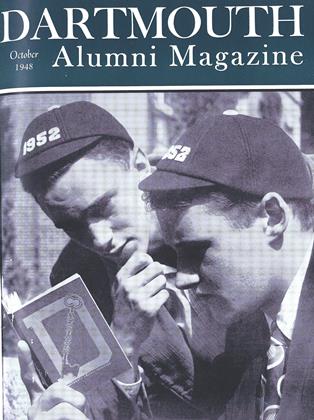THE bells which summon students and faculty to eight o'clock classes on the morning of October 1 will sound the opening of Dartmouth's 180 th academic year. In the bustle and excitement of launching a new year, members of the College are likely to pause only for the brief duration of Convocation to consider how long 180 years really are and what they represent as an accumulation of vision, work and sacrifice on the part of countless Dartmouth men who were determined that the College should go steadily ahead.
The material assets of Dartmouth today are taken pretty much for granted, as is nearly everything else of a physical sort in the modern world. It would be cause for worry, however, if the vastly greater spiritual resources of the College should likewise be taken for granted, for they exist, even in the College's 180 th year, only to the extent that they are valued and fostered by Dartmouth men today. One wonders, for example, how aware undergraduates are of the fact that membership in the College gives them the increasingly rare privilege of being part of a community of men in which the free spirit
prevails. Alumni, in retrospect, will know how to value that priceless heritage which Presidents Tucker and Hopkins enriched and which President Dickey has declared to be the core of Dartmouth College.
Speaking at the meeting of the General Alumni Association in June, President Dickey defined the free spirit as "the spirit which permits freedom of inquiry, which permits freedom of speech, which permits freedom of thought and conviction." Without that free spirit at the core of Dartmouth as a liberal arts college, Dartmouth would no longer be Dartmouth, he said.
The opening of a new college year is a pertinent time for reaffirming the truth of the President's state ment. And the fall of 1948, when the country is embarked upon a national political campaign in which differences of opinion will produce bitter feeling and the usual exaggerated charges, is an especially opportune time to remind ourselves that whatever thinking may prevail elsewhere, Dartmouth's responsibility is to maintain that free spirit at all costs. As one notes throughout the country an overzealous application of labels and witnesses the un-American denial of free speech because of differences of political opinion, the realization grows that there is a great deal more than institutional integrity involved in the course of action which a college sets for itself. The nation apparently can do with a few more examples of how it is possible to underwrite the principles of free speech and responsible conviction without necessarily underwriting the views put forth under the operation of that freedom.
Some men sincerely argue that the College should build a wall of disinterestedness around itself and hold aloof from the bitter controversies of the "outside" world. There are two great errors in this line of thought. First, the College consists primarily of thinking men; and secondly, the day no longer exists when anything of national or international import is "outside" the interest or the responsibility of the liberal arts college. The College must never raise walls to the freedom of inquiry, of thought, and of honestly expressed conviction.
All this adds up to much more than a timely theme for the opening of the 180th year. Dartmouth men cannot give too much thought or too much value to what is the core of the College's greatness. The free spirit is an increasingly precious thing in the world today, and it is no easy responsibility to provide the soil in which it flourishes. Alumni, no less than administration, students and faculty, have a share in that responsibility, which, simply stated, is making sure that Dartmouth remains Dartmouth.
We Announce — With this issue of the 1948-49 publica- tion year the DARTMOUTH ALUMNI MAGA-ZINE adds a touch of green to its regular cover design, and it also puts into effect a more efficient and economical mailing sys- tem. From now on the MAGAZINE will reach you without an encasing envelope. The latter, while protective, has become too costly. A further advantage of adopting the standard magazine practice of stamp- ing the mailing address directly on the back cover is the greater speed and sim- plicity with which the ALUMNI MAGAZINE can be sent from the bindery to you. Effective with this issue, the MAGAZINE also announces an increase in its subscrip- tion rate from $3.00 to $3.50 a year and in its single-copy price from 35 to 40 cents.
 View Full Issue
View Full Issue
More From This Issue
-
 Article
ArticleShould the Athlete Rate a Preference?
October 1948 By EDWARD T. CHAMBERLAIN JR. '36 -
 Class Notes
Class Notes1918
October 1948 By ERNEST H. EARLEY, DONALD L. BARR, DAVID L. GARRATT -
 Class Notes
Class Notes1921
October 1948 By DONALD G. MIX, ROBERT M. MACDONALD, ROBERT P. BURROUGHS -
 Class Notes
Class Notes1926
October 1948 By E. PAUL VENNEMAN, HERBERT F. DARLINC, ROBERT M. STOPFORD -
 Class Notes
Class Notes1917
October 1948 By KARL W. KOENIGER, DONALD BROOKS -
 Class Notes
Class Notes1912
October 1948 By HENRY K. URION, RALPH D. PETTINGELL, HENRY B. VAN DYNE
C.E.W.
-
 Article
ArticleTHE COLLEGE
June 1950 By C.E.W. -
 Article
ArticleMay Weekend
June 1950 By C.E.W. -
 Article
ArticleConcerning the Princeton Game
January 1952 By C.E.W. -
 Article
ArticleHuman Relations
October 1952 By C.E.W. -
 Books
BooksThe Magazine's Loss
DECEMBER 1963 By C.E.W. -
 Feature
FeaturePostwar Change in Dartmouth's Educational Program
APRIL 1966 By C.E.W.







